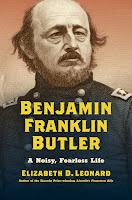New Arrival:
• Benjamin Franklin Butler: A Noisy, Fearless Life by Elizabeth D. Leonard (UNC Press, 2022).
Over the past decade or two, readers have encountered intensified scholarly conversation over how Civil War "political generals" (or, if you prefer, "politician-generals") should be defined and how we might reevaluate their value and performance, particularly in the context of the Union Army's war effort. Heavily involved in that discussion is reassessing a political general's contributions on and off the battlefield, and some scholars have argued that weighing one against the other can often result in a net positive. Heavily involved in this ongoing debate is the military and political career of Major General Benjamin Franklin Butler.
Butler's Civil War service as a Union Army volunteer general clearly had its ups and downs. Praised for his efficient work in maintaining lines of communication to the US capital in 1861, Butler's reputation took a bit of a dive after the embarrassing defeat at Big Bethel (which he did not oversee in person). This was followed by a string of successes along the North Carolina coast and in the Gulf, the most high-profile accomplishment being Butler's command of the army component of the triumphant 1862 New Orleans expedition. In late-1863 Butler returned to Virginia, and his leadership of the Army of the James was an overall failure. Preceded by one final fiasco off Fort Fisher in North Carolina, his career as a field commander finally came to an ignominious end in early 1865.
Though Butler's highly controversial military career is a major part of this study (three out of its eight chapters address the Civil War years), reevaluating that part of his life is not the principal guiding focus of Elizabeth Leonard's Benjamin Franklin Butler: A Noisy, Fearless Life. From the description: Leonard's biography "chronicles Butler's successful career in the law defending the rights of the Lowell Mill girls and other workers, his achievements as one of Abraham Lincoln's premier civilian generals, and his role in developing wartime policy in support of slavery's fugitives as the nation advanced toward emancipation." However, in the book's examination of Butler's life before, during, and after the Civil War, it is the last that gets the most attention of the three. Over the volume's latter chapters, Leonard "highlights Butler's personal and political evolution, revealing how his limited understanding of racism and the horrors of slavery transformed over time, leading him into a postwar role as one of the nation's foremost advocates for Black freedom and civil rights."
"(P)eeling away generations of previous assumptions and characterizations to provide a definitive life of a consequential man," is the goal of Leonard's "nuanced portrait" of "one of the most important and controversial military and political leaders of the Civil War and Reconstruction eras."


No comments:
Post a Comment
***PLEASE READ BEFORE COMMENTING***: You must SIGN YOUR NAME ( First and Last) when submitting your comment. In order to maintain civil discourse and ease moderating duties, anonymous comments will be deleted. Comments containing outside promotions, self-promotion, and/or product links will also be removed. Thank you for your cooperation.